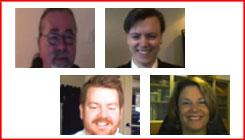The most compelling bias or, I guess, the strongest signal of bias that we’ve seen has been against people with non-traditional educational and work backgrounds. If you didn’t go to a top school and you didn’t work at a top company, it’s going to be really, really hard for you to get in the door.This speaks to the dichotomy of bootcamps and MOOCs (Massive Open Online Courses). While those who go through these programs' accelerated training feel more prepared for work than those graduating university, there’s data suggesting they have more difficulty actually landing jobs. The hiring bias may not even be entirely human: Bots are increasingly used to screen résumés. As Lerner points out, many companies discover that, after interviewing anonymous candidates, the person was already in their system, and had been rejected before a human interacted with them: “What we’ve seen repeatedly, and this is the thing that blows my mind, is with some of the bigger customers that we have where they get a lot of inbound applications, people have applied, they’ve gotten rejected at the résumé screen, so before anybody ever interviewed them." And as a recent Dice survey suggests, up to 68 percent of Baby Boomers don’t apply for jobs because of age, with 40 percent of Generation X-ers chiming in that ageism is affecting their ability to earn. A full 80 percent of tech pros 46-49 years of age think that ageism at companies will affect their careers. Bias extends beyond age: Another 21 percent of respondents to Dice's survey report gender bias at work, and 11 percent report a political stance has proven detrimental to them or a coworker. All this information serves a common narrative: the tech hiring process is broken. Experienced, qualified candidates don’t get jobs, and older professionals with a long tail of on-the-job know-how feel as though a few grey hairs will prevent them from being able to work effectively. Crafting a better résumé can help, and targeting the right job is always important. We also suggest reading our piece on traits that keep older tech pros working, as it has some handy tips on staying relevant in an ever-changing tech landscape.
Be Careful: Bias May Bite Before You Ever Land an Interview
How severe is bias in hiring? According to one source, hiring bias may cost professionals some 40 percent of the roles they're qualified for. In an interview with Girl Geek X, interviewing.io CEO Aline Lerner suggested that 40 percent of the hires her company made in the past two years have been people who were qualified for jobs at other companies, but rejected based on some form of bias. Learner doesn’t assume why that bias occurs, but notes it’s not always about image:



